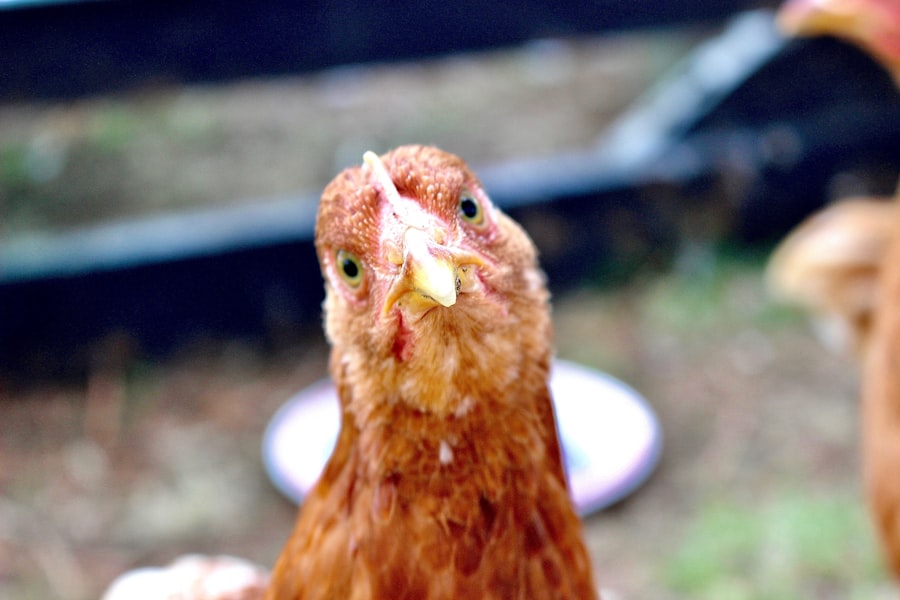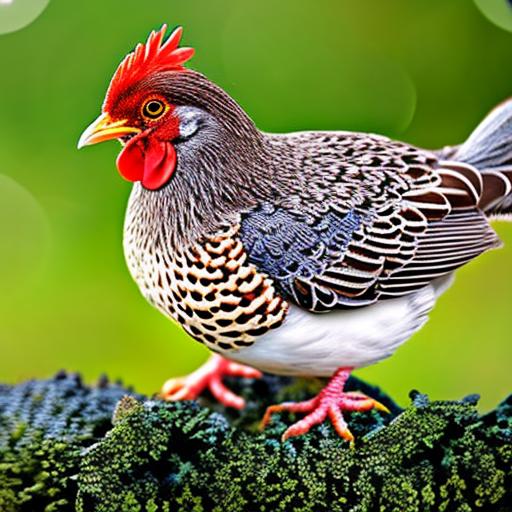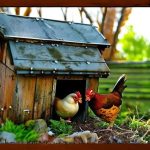Keeping chickens in the garden has become a growing trend in recent years. More and more people are realizing the benefits of having these feathered friends in their backyard. Not only do they provide fresh eggs, but they also offer natural pest control and fertilizer for the garden. In this article, we will explore the various benefits of keeping chickens in the garden, discuss the different breeds suitable for small and large gardens, provide tips for building and maintaining a chicken coop, and explore ways to integrate chickens into your garden ecosystem.
Key Takeaways
- Keeping chickens in your garden can provide many benefits, including fresh eggs, natural pest control, and fertilizer for your plants.
- When choosing a chicken breed for your garden, consider factors such as size, temperament, and egg-laying ability.
- For small gardens, some of the best chicken breeds include the bantam, silkie, and frizzle.
- Large gardens can accommodate breeds such as the Rhode Island Red, Plymouth Rock, and Sussex.
- When building a chicken coop, consider factors such as ventilation, predator protection, and ease of cleaning. Regular maintenance is also important for keeping your chickens healthy and happy.
Benefits of Keeping Chickens in the Garden
One of the main benefits of keeping chickens in the garden is having a constant supply of fresh eggs. There is nothing quite like collecting eggs from your own backyard and knowing exactly where they came from. Fresh eggs are not only delicious, but they are also more nutritious than store-bought eggs. Chickens that are allowed to roam freely in the garden have access to a variety of plants and insects, which results in eggs that are higher in omega-3 fatty acids and vitamins.
Another benefit of having chickens in the garden is natural pest control. Chickens love to eat insects, slugs, and snails, which can be a nuisance in the garden. By allowing chickens to roam freely, they will help keep these pests under control without the need for harmful pesticides. This not only benefits your garden but also promotes a healthier ecosystem.
Chickens also provide an excellent source of fertilizer for your garden. Their droppings are rich in nitrogen, phosphorus, and potassium, which are essential nutrients for plant growth. By allowing chickens to roam freely in your garden or by using their droppings as compost, you can improve soil fertility and promote healthy plant growth.
Choosing the Right Chicken Breed for Your Garden
Choosing the right chicken breed for your garden is crucial to ensure their well-being and productivity. There are many different breeds to choose from, each with its own characteristics and requirements. Some breeds are better suited for small gardens, while others thrive in larger spaces. Factors to consider when choosing a breed include temperament, egg production, size, and climate adaptability.
Some popular chicken breeds for small gardens include the Bantam, Silkie, and Polish. Bantams are small in size and require less space compared to other breeds. They are known for their friendly temperament and are great for families with children. Silkie chickens are known for their fluffy feathers and gentle nature. They are excellent brooders and make great pets. Polish chickens have unique crests on their heads and are known for their friendly and docile nature.
For larger gardens, some popular chicken breeds include the Rhode Island Red, Sussex, and Orpington. Rhode Island Reds are known for their excellent egg-laying abilities and adaptability to various climates. Sussex chickens are known for their hardiness and ability to forage well. They come in various colors and are great for free-ranging in larger spaces. Orpington chickens are large and friendly birds that lay a good number of eggs. They are also known for their meat quality.
Top 5 Chicken Breeds for Small Gardens
1. Bantam: Bantams are small in size and require less space compared to other breeds. They are known for their friendly temperament and make great pets for families with children.
2. Silkie: Silkie chickens have fluffy feathers and a gentle nature. They are excellent brooders and make great pets.
3. Polish: Polish chickens have unique crests on their heads and are known for their friendly and docile nature.
4. Serama: Serama chickens are the smallest breed of chicken in the world. They require very little space and make great pets.
5. Sebright: Sebright chickens have beautiful laced feathers and are known for their friendly and curious nature. They are great for small gardens.
Top 5 Chicken Breeds for Large Gardens
1. Rhode Island Red: Rhode Island Reds are known for their excellent egg-laying abilities and adaptability to various climates. They are a popular choice for backyard chicken keepers.
2. Sussex: Sussex chickens are known for their hardiness and ability to forage well. They come in various colors and are great for free-ranging in larger spaces.
3. Orpington: Orpington chickens are large and friendly birds that lay a good number of eggs. They are also known for their meat quality.
4. Australorp: Australorps are known for their exceptional egg-laying abilities, often producing more than 300 eggs per year. They are also docile and easy to handle.
5. Plymouth Rock: Plymouth Rock chickens are known for their dual-purpose nature, meaning they are good for both egg production and meat quality. They are also hardy and adaptable to various climates.
Factors to Consider When Building a Chicken Coop in Your Garden

Building a chicken coop is an important aspect of keeping chickens in your garden. It provides them with shelter, protection from predators, and a safe place to lay their eggs. When building a chicken coop, there are several factors to consider, including size, ventilation, security, and ease of cleaning.
The size of the chicken coop will depend on the number of chickens you plan to keep. Each chicken should have at least 4 square feet of space inside the coop and 10 square feet of outdoor space. It is important to provide enough space for the chickens to move around comfortably.
Ventilation is crucial to prevent the buildup of moisture and ammonia inside the coop. Good airflow will help keep the chickens healthy and prevent respiratory issues. Windows or vents should be installed to allow fresh air to circulate.
Security is another important factor to consider when building a chicken coop. The coop should be predator-proof, with sturdy walls and a secure door. It is important to protect the chickens from predators such as raccoons, foxes, and rats.
Cleaning the chicken coop is an essential part of maintaining a healthy environment for your chickens. The coop should be designed in a way that makes it easy to clean. This can include features such as removable roosts and nesting boxes, as well as easy access to the floor for cleaning.
Tips for Designing and Constructing a Chicken Coop
When designing and constructing a chicken coop, there are several tips to keep in mind. First, choose the right materials for the coop. Wood is a popular choice due to its durability and natural insulation properties. Make sure to use untreated wood to avoid any harmful chemicals leaching into the coop.
Consider the layout of the coop to maximize space and functionality. Include features such as roosting bars, nesting boxes, and a separate area for feeding and watering. Make sure there is enough space for the chickens to move around comfortably.
Provide adequate lighting inside the coop. Chickens need natural light to lay eggs consistently. Install windows or skylights to allow sunlight to enter the coop during the day.
Consider adding a run or outdoor enclosure for the chickens to have access to fresh air and sunlight. This will also provide them with additional space for exercise and foraging.
Chicken Coop Maintenance: Keeping Your Chickens Happy and Healthy
Maintaining a chicken coop is essential for keeping your chickens happy and healthy. Regular cleaning is important to prevent the buildup of waste and bacteria. Remove soiled bedding, droppings, and any uneaten food on a regular basis.
Provide fresh water daily and ensure that it is clean and free from contaminants. Chickens require access to clean water at all times.
Inspect the coop regularly for any signs of damage or wear. Repair any holes or cracks in the walls or roof to prevent predators from entering. Replace any worn-out or broken parts of the coop.
Regularly check for signs of pests such as mites or lice. Treat the chickens and the coop if necessary to prevent infestations.
Integrating Chickens into Your Garden Ecosystem
Integrating chickens into your garden ecosystem can provide numerous benefits. Chickens can help control pests by eating insects, slugs, and snails. They can also help with weed control by scratching and pecking at the ground.
Allowing chickens to free-range in your garden can also help with soil fertility. Their droppings are rich in nutrients and can be used as compost or fertilizer for your plants.
Consider creating designated areas in your garden where chickens can forage and scratch without causing damage to your plants. Use fencing or netting to protect sensitive areas such as vegetable beds or flower gardens.
Enjoying the Rewards of Keeping Chickens in Your Garden
Keeping chickens in the garden can be a rewarding experience. Not only do they provide fresh eggs, but they also offer natural pest control and fertilizer for the garden. By choosing the right breed, building a suitable chicken coop, and integrating them into your garden ecosystem, you can enjoy the benefits of having these feathered friends in your backyard. So why not consider keeping chickens in your garden and enjoy the rewards they bring?
If you’re considering keeping chickens in your garden, you may also be interested in learning about the best chickens to keep. One important aspect to consider is their diet. Did you know that geese can eat chicken feed? In a related article on Poultry Wizard, you can find out more about whether geese can eat chicken feed and how it can affect their health. Understanding the dietary needs of different poultry species can help you make informed decisions when it comes to raising chickens in your garden. To learn more about this topic, check out the article “Can Geese Eat Chicken Feed?”
FAQs
What are the best chickens to keep in a garden?
The best chickens to keep in a garden are those that are docile, friendly, and good foragers. Some popular breeds include Rhode Island Reds, Plymouth Rocks, and Sussex.
What are the benefits of keeping chickens in a garden?
Keeping chickens in a garden can provide a source of fresh eggs, natural pest control, and fertilizer for the garden. Chickens can also be entertaining and enjoyable pets.
What do chickens need to thrive in a garden?
Chickens need access to fresh water, a balanced diet, shelter from the elements, and a safe and secure coop to roost in at night. They also need space to roam and forage.
What should be considered before keeping chickens in a garden?
Before keeping chickens in a garden, it is important to check local zoning laws and regulations. It is also important to consider the amount of space available, the time and effort required to care for the chickens, and the potential for noise and odor.
How can chickens be kept safe from predators in a garden?
Chickens can be kept safe from predators in a garden by providing a secure coop and run, using fencing to keep out predators, and keeping the chickens locked up at night. It is also important to remove any potential hiding places for predators, such as brush piles or tall grass.
Meet Walter, the feathered-friend fanatic of Florida! Nestled in the sunshine state, Walter struts through life with his feathered companions, clucking his way to happiness. With a coop that’s fancier than a five-star hotel, he’s the Don Juan of the chicken world. When he’s not teaching his hens to do the cha-cha, you’ll find him in a heated debate with his prized rooster, Sir Clucks-a-Lot. Walter’s poultry passion is no yolk; he’s the sunny-side-up guy you never knew you needed in your flock of friends!







